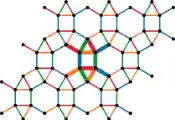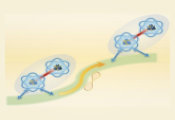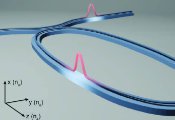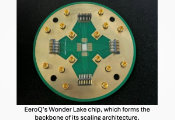With ORNL, UT Works Toward a Quantum Future
November 11, 2025 -- The University of Tennessee, Knoxville, expects to receive $2.3 million to play a key role in the nation’s quantum future, thanks to renewed funding for the Quantum Science Center (QSC) at Oak Ridge National Laboratory (ORNL).
The U.S. Department of Energy is investing $125 million in QSC over the next five years to pioneer quantum-accelerated high-performance computing (QHPC), developing open-source software for quantum-classical workflows that accelerate scientific advancements across multiple disciplines. Since its founding in 2018 as part of the National Quantum Initiative Act, the QSC has pooled the unique strengths of national laboratories, industry partners, and academia to build a combined research program in quantum science. UT is part of that collaboration and will receive $2.3 million to lead work in materials and models and to train early-career scientists.
With its commitment to innovation gateways in Advanced Materials and Manufacturing and Artificial Intelligence, the university is well-positioned for this assignment. In 2023, UT launched the Center for Advanced Materials and Manufacturing (CAMM), a premier Materials Research Science and Engineering Center funded by the National Science Foundation. Through experiment, synthesis, and modeling, CAMM is dedicated to discovering advanced materials for new quantum technologies and giving students the opportunity to learn in a world-class environment.
UT is a world leader in quantum spin systems and brings its unique expertise to the validation of quantum-classical computations, which are beyond the reach of conventional computation.
Physics Professor Alan Tennant is the CAMM Director.
“UT is a key part in this,” he said of QSC research. He explained that “machine learning to extract models from quantum magnets has been an important innovation from UT and CAMM, allowing parameters to be determined from materials with neutron scattering which are essential for validating quantum computations. QSC will continue to strengthen its collaboration with CAMM.”
He added that this new funding will also support UT students who will make materials, conduct neutron experiments, and undertake quantum computations.
Tennant said the QSC is building the country’s foundation for a new quantum age and that the university’s involvement puts UT at the center of that work.
“This is actually right in the heart of where tech starts connecting,” he said. “We are integral to the American road map.”
The QSC is headquartered at the Department of Energy’s Oak Ridge National Laboratory, which is managed by UT-Battelle for the DOE Office of Science. By uniting national laboratories, academic institutions and industry partners, the QSC endeavors to advance American innovation and global leadership by enhancing the computational robustness, algorithmic scalability and simulation accuracy of quantum computing systems.




































